- Session 1 – The Man of the Hour (Exodus 1:1 – 4:31)
- Session 2 – Let My People Go (Exodus 5:1 – 11:10)
- Session 3 – Exit (Exodus 12:1 – 15:21)
- Session 4 – Now What (Exodus 15:21 – 18:27)
- Session 5 – OOPS (19:1 – 20:26; 24:1-18; 32:1 – 33 8)
- Session 6 – Moses Is the Man (Exodus 33:9 – 34:35; 40:1-38; Numbers 10:11-36)
- Session 7 – A Complaining Bunch (Numbers 11:1 – 14:45)
- Session 8 – Leadership and Control (Numbers 16:1 – 20:13)
- Session 9 – About to Enter the Land (Numbers 20:14 – 24:25)
- Session 10 – On Your Mark, Get Set (Numbers 25:1 – 26:4; 31:1 – 32:42)
During our first session, we looked at Exodus 1:1 – 4:31. Below is a recording our discussion and the passage.
Exodus 1:1 – 4:31
These are the names of the sons of Israel who came to Egypt with Jacob, each with his household: Reuben, Simeon, Levi, and Judah, Issachar, Zebulun, and Benjamin, Dan and Naphtali, Gad and Asher. The total number of people born to Jacob was seventy. Joseph was already in Egypt. Then Joseph died, and all his brothers, and that whole generation. But the Israelites were fruitful and prolific; they multiplied and grew exceedingly strong, so that the land was filled with them.
Now a new king arose over Egypt, who did not know Joseph. He said to his people, “Look, the Israelite people are more numerous and more powerful than we. Come, let us deal shrewdly with them, or they will increase and, in the event of war, join our enemies and fight against us and escape from the land.” Therefore they set taskmasters over them to oppress them with forced labor. They built supply cities, Pithom and Rameses, for Pharaoh. But the more they were oppressed, the more they multiplied and spread, so that the Egyptians came to dread the Israelites. The Egyptians became ruthless in imposing tasks on the Israelites, and made their lives bitter with hard service in mortar and brick and in every kind of field labor. They were ruthless in all the tasks that they imposed on them.
The king of Egypt said to the Hebrew midwives, one of whom was named Shiphrah and the other Puah, “When you act as midwives to the Hebrew women, and see them on the birthstool, if it is a boy, kill him; but if it is a girl, she shall live.” But the midwives feared God; they did not do as the king of Egypt commanded them, but they let the boys live. So the king of Egypt summoned the midwives and said to them, “Why have you done this, and allowed the boys to live?” The midwives said to Pharaoh, “Because the Hebrew women are not like the Egyptian women; for they are vigorous and give birth before the midwife comes to them.” So God dealt well with the midwives; and the people multiplied and became very strong. And because the midwives feared God, he gave them families. Then Pharaoh commanded all his people, “Every boy that is born to the Hebrews you shall throw into the Nile, but you shall let every girl live.”
Now a man from the house of Levi went and married a Levite woman. The woman conceived and bore a son; and when she saw that he was a fine baby, she hid him three months. When she could hide him no longer she got a papyrus basket for him, and plastered it with bitumen and pitch; she put the child in it and placed it among the reeds on the bank of the river. His sister stood at a distance, to see what would happen to him.
The daughter of Pharaoh came down to bathe at the river, while her attendants walked beside the river. She saw the basket among the reeds and sent her maid to bring it. When she opened it, she saw the child. He was crying, and she took pity on him, “This must be one of the Hebrews’ children,” she said. Then his sister said to Pharaoh’s daughter, “Shall I go and get you a nurse from the Hebrew women to nurse the child for you?” Pharaoh’s daughter said to her, “Yes.” So the girl went and called the child’s mother. Pharaoh’s daughter said to her, “Take this child and nurse it for me, and I will give you your wages.” So the woman took the child and nursed it. When the child grew up, she brought him to Pharaoh’s daughter, and she took him as her son. She named him Moses, “because,” she said, “I drew him out of the water.”
One day, after Moses had grown up, he went out to his people and saw their forced labor. He saw an Egyptian beating a Hebrew, one of his kinsfolk. He looked this way and that, and seeing no one he killed the Egyptian and hid him in the sand. When he went out the next day, he saw two Hebrews fighting; and he said to the one who was in the wrong, “Why do you strike your fellow Hebrew?” He answered, “Who made you a ruler and judge over us? Do you mean to kill me as you killed the Egyptian?” Then Moses was afraid and thought, “Surely the thing is known.” When Pharaoh heard of it, he sought to kill Moses. But Moses fled from Pharaoh. He settled in the land of Midian, and sat down by a well.
The priest of Midian had seven daughters. They came to draw water, and filled the troughs to water their father’s flock. But some shepherds came and drove them away. Moses got up and came to their defense and watered their flock. When they returned to their father Reuel, he said, “How is it that you have come back so soon today?” They said, “An Egyptian helped us against the shepherds; he even drew water for us and watered the flock.” He said to his daughters, “Where is he? Why did you leave the man? Invite him to break bread.” Moses agreed to stay with the man, and he gave Moses his daughter Zipporah in marriage. She bore a son, and he named him Gershom; for he said, “I have been an alien residing in a foreign land.”
After a long time the king of Egypt died. The Israelites groaned under their slavery, and cried out. Out of the slavery their cry for help rose up to God. God heard their groaning, and God remembered his covenant with Abraham, Isaac, and Jacob. God looked upon the Israelites, and God took notice of them.
Moses was keeping the flock of his father-in-law Jethro, the priest of Midian; he led his flock beyond the wilderness, and came to Horeb, the mountain of God. There the angel of the Lord appeared to him in a flame of fire out of a bush; he looked, and the bush was blazing, yet it was not consumed. Then Moses said, “I must turn aside and look at this great sight, and see why the bush is not burned up.” When the Lord saw that he had turned aside to see, God called to him out of the bush, “Moses, Moses!” And he said, “Here I am.” Then he said, “Come no closer! Remove the sandals from your feet, for the place on which you are standing is holy ground.” He said further, “I am the God of your father, the God of Abraham, the God of Isaac, and the God of Jacob.” And Moses hid his face, for he was afraid to look at God.
Then the Lord said, “I have observed the misery of my people who are in Egypt; I have heard their cry on account of their taskmasters. Indeed, I know their sufferings, and I have come down to deliver them from the Egyptians, and to bring them up out of that land to a good and broad land, a land flowing with milk and honey, to the country of the Canaanites, the Hittites, the Amorites, the Perizzites, the Hivites, and the Jebusites. The cry of the Israelites has now come to me; I have also seen how the Egyptians oppress them. So come, I will send you to Pharaoh to bring my people, the Israelites, out of Egypt.”
But Moses said to God, “Who am I that I should go to Pharaoh, and bring the Israelites out of Egypt?” He said, “I will be with you; and this shall be the sign for you that it is I who sent you: when you have brought the people out of Egypt, you shall worship God on this mountain.” But Moses said to God, “If I come to the Israelites and say to them, ‘The God of your ancestors has sent me to you,’ and they ask me, ‘What is his name?’ what shall I say to them?” God said to Moses, “I AM WHO I AM.” He said further, “Thus you shall say to the Israelites, ‘I AM has sent me to you.’” God also said to Moses, “Thus you shall say to the Israelites, ‘The Lord, the God of your ancestors, the God of Abraham, the God of Isaac, and the God of Jacob, has sent me to you’: This is my name forever, and this my title for all generations.
Go and assemble the elders of Israel, and say to them, ‘The Lord, the God of your ancestors, the God of Abraham, of Isaac, and of Jacob, has appeared to me, saying: I have given heed to you and to what has been done to you in Egypt. I declare that I will bring you up out of the misery of Egypt, to the land of the Canaanites, the Hittites, the Amorites, the Perizzites, the Hivites, and the Jebusites, a land flowing with milk and honey.’ They will listen to your voice; and you and the elders of Israel shall go to the king of Egypt and say to him, ‘The Lord, the God of the Hebrews, has met with us; let us now go a three days’ journey into the wilderness, so that we may sacrifice to the Lord our God.’ I know, however, that the king of Egypt will not let you go unless compelled by a mighty hand. So I will stretch out my hand and strike Egypt with all my wonders that I will perform in it; after that he will let you go. I will bring this people into such favor with the Egyptians that, when you go, you will not go empty-handed; each woman shall ask her neighbor and any woman living in the neighbor’s house for jewelry of silver and of gold, and clothing, and you shall put them on your sons and on your daughters; and so you shall plunder the Egyptians.”
Then Moses answered, “But suppose they do not believe me or listen to me, but say, ‘The Lord did not appear to you.’” The Lord said to him, “What is that in your hand?” He said, “A staff.” And he said, “Throw it on the ground.” So he threw the staff on the ground, and it became a snake; and Moses drew back from it. Then the Lord said to Moses, “Reach out your hand, and seize it by the tail” —so he reached out his hand and grasped it, and it became a staff in his hand— “so that they may believe that the Lord, the God of their ancestors, the God of Abraham, the God of Isaac, and the God of Jacob, has appeared to you.” Again, the Lord said to him, “Put your hand inside your cloak.” He put his hand into his cloak; and when he took it out, his hand was leprous, as white as snow. Then God said, “Put your hand back into your cloak” —so he put his hand back into his cloak, and when he took it out, it was restored like the rest of his body— “If they will not believe you or heed the first sign, they may believe the second sign. If they will not believe even these two signs or heed you, you shall take some water from the Nile and pour it on the dry ground; and the water that you shall take from the Nile will become blood on the dry ground.”
But Moses said to the Lord, “O my Lord, I have never been eloquent, neither in the past nor even now that you have spoken to your servant; but I am slow of speech and slow of tongue.” Then the Lord said to him, “Who gives speech to mortals? Who makes them mute or deaf, seeing or blind? Is it not I, the Lord? Now go, and I will be with your mouth and teach you what you are to speak.” But he said, “O my Lord, please send someone else.” Then the anger of the Lord was kindled against Moses and he said, “What of your brother Aaron, the Levite? I know that he can speak fluently; even now he is coming out to meet you, and when he sees you his heart will be glad. You shall speak to him and put the words in his mouth; and I will be with your mouth and with his mouth, and will teach you what you shall do. He indeed shall speak for you to the people; he shall serve as a mouth for you, and you shall serve as God for him. Take in your hand this staff, with which you shall perform the signs.”
Moses went back to his father-in-law Jethro and said to him, “Please let me go back to my kindred in Egypt and see whether they are still living.” And Jethro said to Moses, “Go in peace.” The Lord said to Moses in Midian, “Go back to Egypt; for all those who were seeking your life are dead.” So Moses took his wife and his sons, put them on a donkey and went back to the land of Egypt; and Moses carried the staff of God in his hand. And the Lord said to Moses, “When you go back to Egypt, see that you perform before Pharaoh all the wonders that I have put in your power; but I will harden his heart, so that he will not let the people go. Then you shall say to Pharaoh, ‘Thus says the Lord: Israel is my firstborn son. I said to you, “Let my son go that he may worship me.” But you refused to let him go; now I will kill your firstborn son.’”
On the way, at a place where they spent the night, the Lord met him and tried to kill him. But Zipporah took a flint and cut off her son’s foreskin, and touched Moses’ feet with it, and said, “Truly you are a bridegroom of blood to me!” So he let him alone. It was then she said, “A bridegroom of blood by circumcision.” The Lord said to Aaron, “Go into the wilderness to meet Moses.” So he went; and he met him at the mountain of God and kissed him. Moses told Aaron all the words of the Lord with which he had sent him, and all the signs with which he had charged him. Then Moses and Aaron went and assembled all the elders of the Israelites. Aaron spoke all the words that the Lord had spoken to Moses, and performed the signs in the sight of the people. The people believed; and when they heard that the Lord had given heed to the Israelites and that he had seen their misery, they bowed down and worshiped.

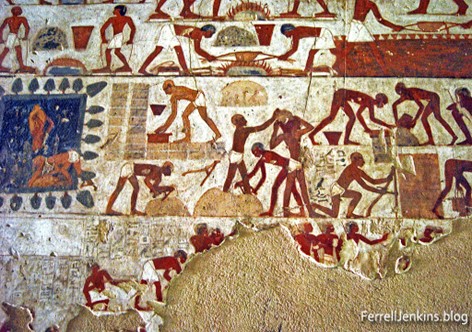
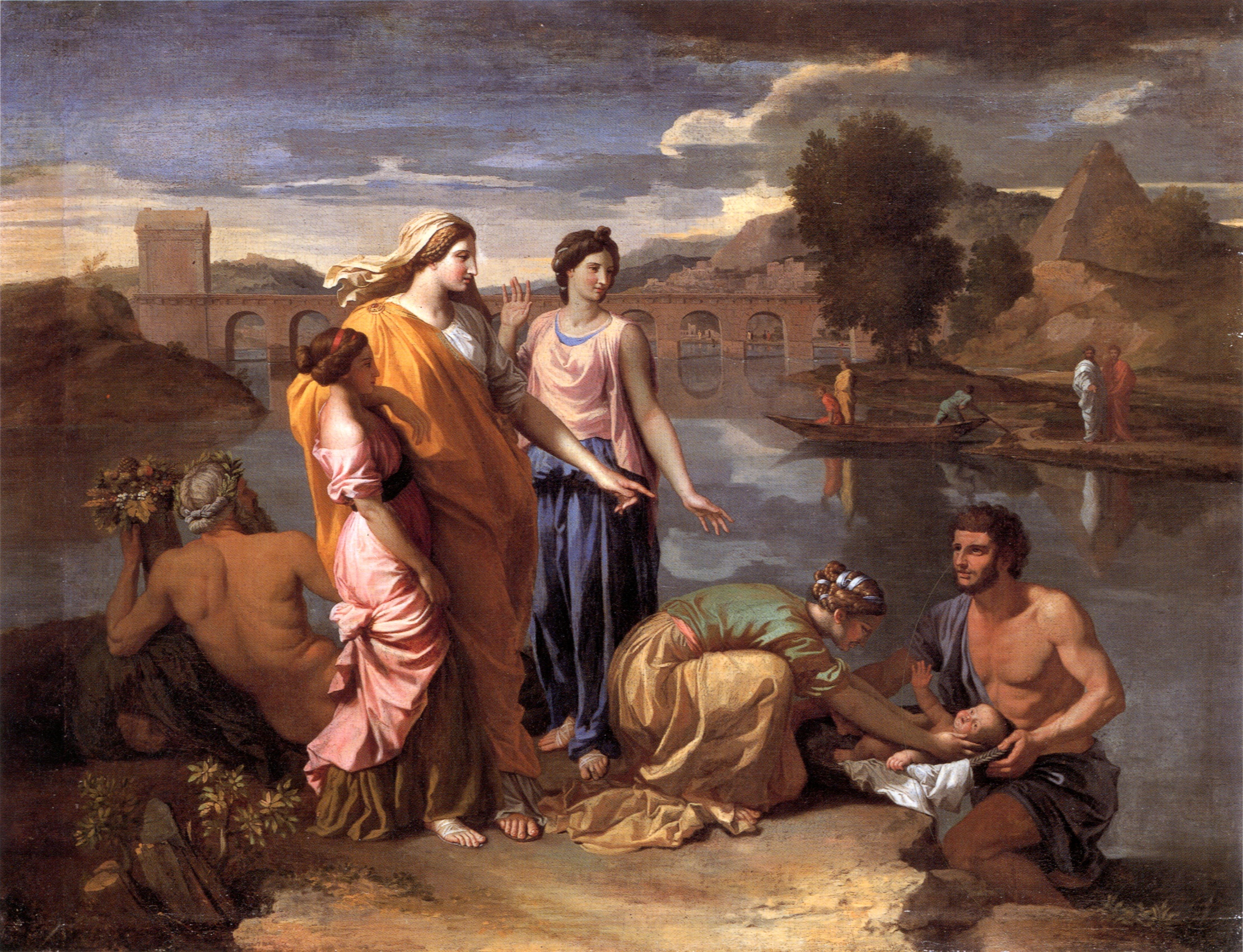

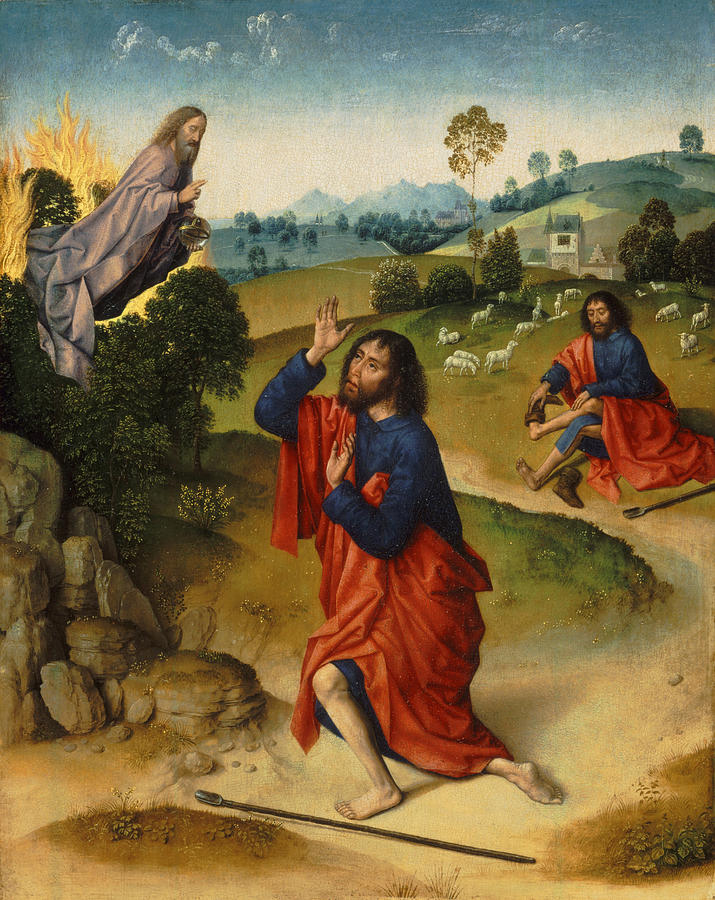
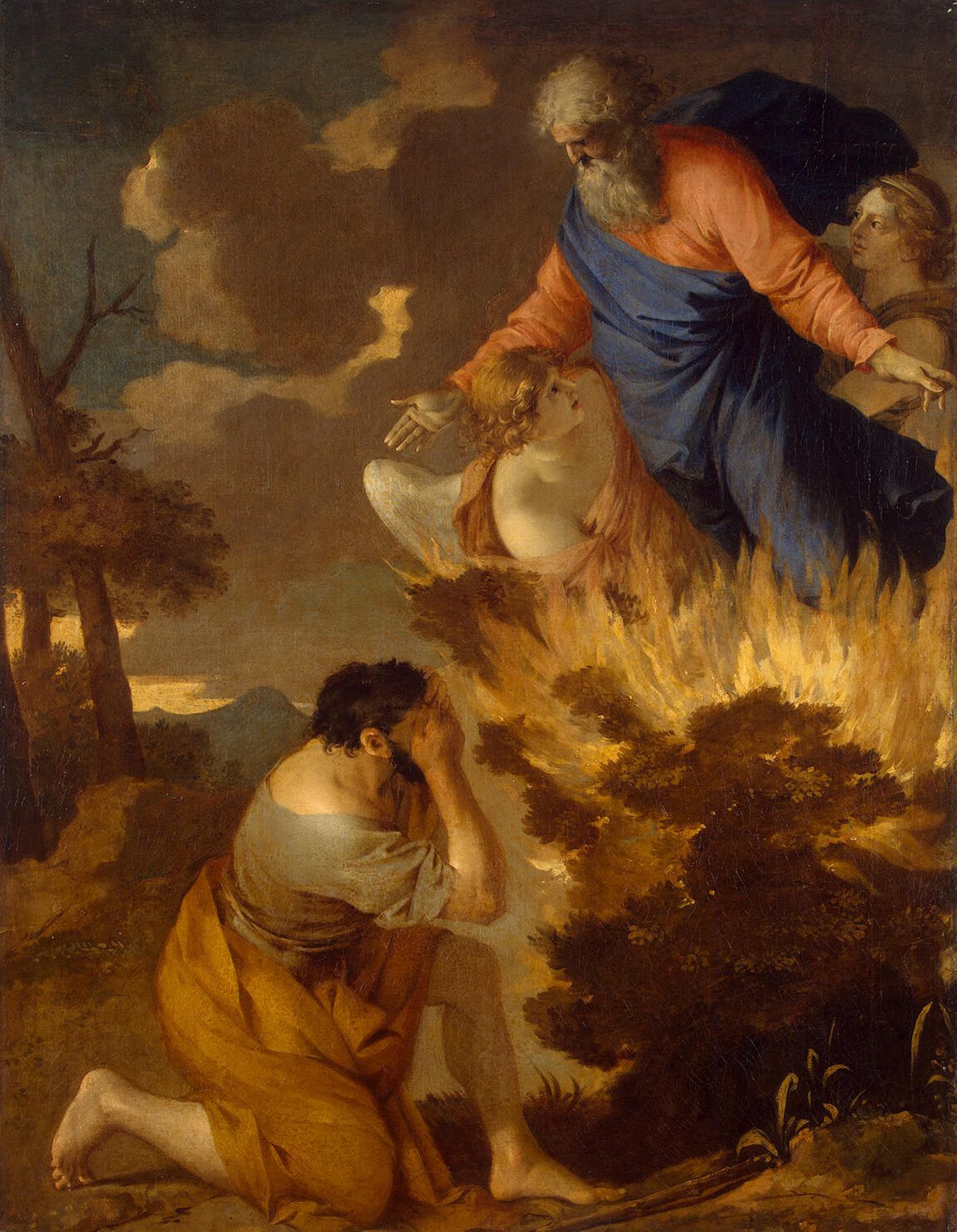
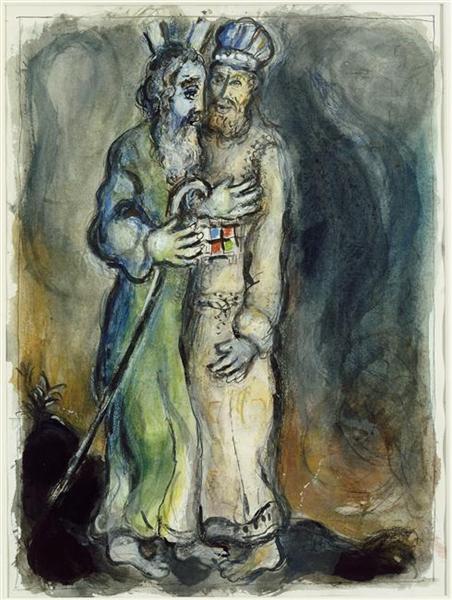

No comments:
Post a Comment